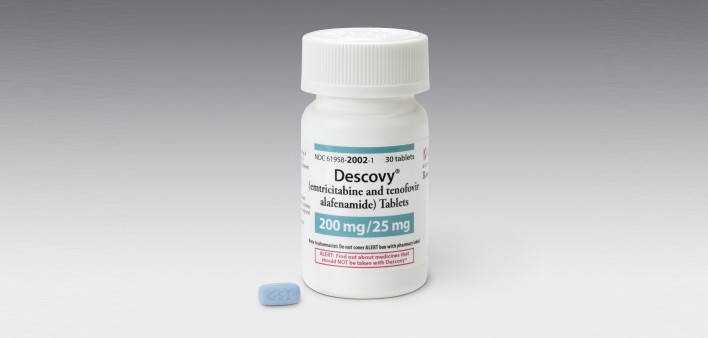Replacing Epzicom (abacavir/lamivudine) as a component of a three-drug HIV regimen with Descovy (emtricitabine/tenofovir alafenamide) suppresses the virus as effectively and is similarly safe for the bones and kidneys, Contagion Live reports.
Publishing their findings in The Lancet HIV, researchers conducted a randomized, double-blind, active-controlled noninferiority Phase III trial of HIV-positive adults recruited from 79 sites in 11 nations in North America and Europe. Eligible participants had a fully suppressed viral load and were taking a three-drug regimen containing Epzicom.
The trial is ongoing, but for this published paper, the researchers looked only at those who enrolled between June 2015 and May 2016. Out of 501 people, 280 were randomly assigned to switch from Epzicom to Descovy while 276 remained on Epzicom. All participants continued taking the same third drug.
After 48 weeks, 227 (90 percent) of those in the Descovy group and 230 (93 percent) of those in the Epzicom group had a fully suppressed viral load. These rates were within the preset 10 percent margin to determine whether the regimens were noninferior, in other words, equally effective.
There was no significant difference between the two groups in changes in hip and lumbar spine bone mineral density. Tests also indicated that the regimens were similarly safe for the kidneys.
A respective 12 (4 percent) and nine (3 percent) of those in the Descovy and Epzicom groups stopped treatment because of adverse health events. Three people experienced serious treatment-related adverse health events, including one with renal colic (abdominal pain typically caused by kidney stones) and one with neutropenia (low neutrophils in the blood) in the Descovy group and one with a heart attack in the Epzicom group. There were no treatment-related deaths.
“In virologically suppressed patients,” the researchers concluded, “a regimen containing tenofovir alafenamide could be an alternative to those containing abacavir, without concern for new onset of renal or bone toxicities or hyperlipidemia [high blood lipids].”
To read the Contagion Live article, click here.
To read the study abstract, click here.







Comments
Comments